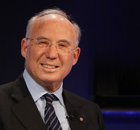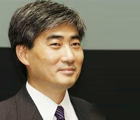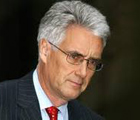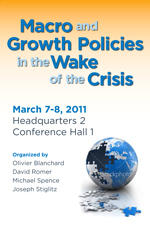Washington, DC, March 7 and 8, 2011
Macro and Growth Policies in the Wake of the Crisis
SESSION III: Financial Intermediation and Regulation
The financial sector, which had been hailed as a hub of innovation and a driver of growth, led to a crisis that brought the world economy to the brink of collapse and caused unemployment for many millions. As a result, there is broad agreement on the need for reform that minimizes the chances of future catastrophes, while maintaining as much as possible of the social benefits of the financial sector. Unfortunately, there is little agreement beyond that.
Background notes on financial intermediation
How should the crisis affect our views about financial intermediation?
by Andrew Crockett
CHAIR
 | Antonio Borges Antonio Borges became Director of the European Department at the International Monetary Fund in December 2010. More |
DISCUSSANTS
 | Jacob A. Frenkel Dr. Jacob A. Frenkel is Chairman of JPMorgan Chase International, a member of the Executive Committee of JPMorgan Chase & Co. and the J.P. Morgan International Council. He also serves as Chairman and CEO of the Group of Thirty (G-30) which is a private, nonprofit, Consultative Group on International Economic and Monetary Affairs. More |
 | Y. Venugopal Reddy Dr. Y.V. Reddy was Governor, Reserve Bank of India, from 2003 to 2008. Subsequently, he was Member of the UN Commission of Experts to the President of the UN General Assembly on Reforms of International Monetary and Financial System. More |
 | Hyun Song Shin Presentation Macroprudential Policies Beyond Basel III Carry Trades, Monetary Policyand Speculative Dynamics Procyclicality and Monetary Aggregates Hyun Song Shin became the Hughes-Rogers Professor of Economics at Princeton University in 2006. More |
 | Adair Turner Presentation The financial crisis and the future of financial regulation Responding to the financial crisis: challenging past assumptions Adair Turner was appointed Financial Services Authority (FSA) Chairman in September 2008. He has combined careers in business, public policy and academia. More |

